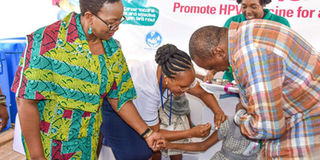Kenya on track in HPV vaccination despite setbacks: CS Kariuki

President Uhuru Kenyatta (R) and Health Cabinet Secretary Sicily Kariuki during the launch of the HPV vaccination programme at Ziwani Primary School grounds on October 18, 2019. PHOTO | WACHIRA MWANGI | NATION MEDIA GROUP
What you need to know:
- So far, 280,000 have received the first dose of the HPV vaccine, manufactured by Merck Pharmaceuticals under brand name Gardasil.
- Ms Kariuki said five counties experienced disruptions in the programme, brought about by the closure of schools as well as floods which ravaged a number of areas across the country.
- Remarking on the controversy surrounding the vaccine’s rollout in Kenya, the CS said the process had been riddled by “superstitions, contrary views from church leaders and cultural beliefs”.
Kenya is on course in the immunisation of 800,000 girls against cervical cancer, Health Cabinet Secretary Sicily Kariuki has said, and allayed fears about the safety of the vaccine.
Ms Kariuki said on Wednesday that the pilot exercise targeted 800,000 girls aged 10 years with the first dose of the vaccine.
So far, 280,000 have received the first dose of the HPV vaccine, manufactured by Merck Pharmaceuticals under brand name Gardasil.
DISRUPTIONS
Ms Kariuki said five counties experienced disruptions in the programme, brought about by the closure of schools as well as floods which ravaged a number of areas across the country.
She assured, however, that the programme will resume in the counties - Mandera, Garissa, Laikipia, Lamu and Turkana - as soon as the county and national governments make arrangements.
She said the government is committed to ensuring all the 800,000 girls receive their second and final dose in order to be assured of protection from cervical cancer infection.
“The affected counties are making arrangements to resume the programme. We intend to ensure no one is left behind in the administration of the first and second doses,” she said.
She spoke on Wednesday at a media briefing in Nairobi called by the ministry and the the Global Alliance for Vaccines and Immunization (Gavi) to give an update on the vaccination programme.
KILLER DISEASE
The vaccine is meant to protect girls from cervical cancer, the second leading kind after breast cancer among Kenyan women.
For a girl's immune system to be fully protected from infection, she requires a second dose six months after receiving the first one.
Cancer is the third leading killer in Kenya, after infectious and cardiovascular diseases.
Cancer watchdog Globocan estimates published in 2018 show there are 47,887 new cases in Kenya daily and 32,987 deaths due to cancer annually.
The leading cancers in Kenya are breast, cervical and oesophageal.
CONTROVERSY
Remarking on the controversy surrounding the vaccine’s rollout in Kenya, the CS said the process had been riddled by “superstitions, contrary views from church leaders and cultural beliefs”.
“It has not been an easy process as we have had to deal with opposing views from church leaders, superstitions and cultural beliefs. However, all this has not been based on exact science, as opposed to the programme, which is based on solid scientific evidence,” she said.
Ms Kariuki appealed to Kenyans not to be swayed by online conspiracy theories on the purpose of the vaccine, stressing that the programme is only aimed at protecting the next generation of Kenyan women against the risk of cervical cancer
“Our project is based on verified scientific research. Do not seek information regarding the vaccine from websites that contain misleading information. Part of the research that went into developing it was carried out in Kitui County between 2013 and 2015."
11TH COUNTRY
With the October 18, 2019 launch of the vaccine, Kenya became the 11th African country to roll out an immunisation programme for the disease caused by the human papilloma virus (HPV), a sexually transmitted infection.
The other countries that offer the vaccine are Uganda, Tanzania, Ethiopia, Malawi, Rwanda, Zambia, Zimbabwe, Botswana, Senegal and Seychelles.
Gavi board chair Dr Ngozi Okonjo-Iweala said 311,000 women die of cervical cancer a year and that 90 percent of them are found in developing countries.
"25 per cent of these, or 73,000 women, are found in Sub-Saharan countries. The three leading countries in Sub-Saharan Africa are Zimbabwe, Malawi, Kenya. We therefore need to focus a lot of attention in this region,” she said.
EDUCATION
Dr Okonjo-Iweala backed use of the vaccine as she briefly reflected on her battle with colon cancer.
“As a survivor, I went through three years of treatment. It is only by God’s grace that I am sitting here today. I am a strong advocate of prevention. If a vaccine like this that can save our girls from cancer in future, why not go for it?”
She added that the programme will serve as a platform for educating girls on the need to be protected from disease.
“The girls will be taken for the jabs by their mothers, aunts, grandmothers and other caregivers. It can be a platform for educating them on the importance of maintaining good health through preventive measures like vaccination," she said.
"This will help them become better mothers and advocates for proper healthcare for their children when they grow up."
She echoed the CS’s remark that the vaccine is not about a reproductive issue.
RESEARCH
Dr Rudi Eggers, the World Health Organization's Country Representative, said it would be irresponsible for parents not to take their children for vaccination.
“It is like travelling in a car driven by a drunk driver and without fastening the seatbelt,” said Dr Eggers.
He told Kenyans that the WHO would not allow use of a vaccine without evidence of its safety and effectiveness.
“We have rigorous testing procedures for every vaccine that is in use, and they must take place before we allow them to be used," he noted,
"There is 20 years of evidence and research available for the cervical cancer vaccine, including the study carried out In Kitui."





